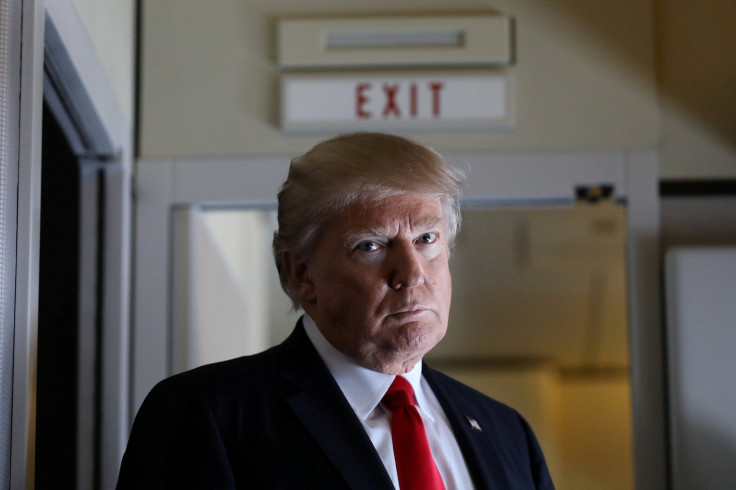Trump Travel Ban Myths And Facts: Can Trump Deport Immigrants Living In The US Legally?

One week after President Donald Trump signed an executive order restricting travelers from seven Muslim-majority countries from entering the United States, concerns are growing about the dictate's reach.
Trump’s executive orders were created “to keep radical Islamic terrorists out of the U.S.” and can impact both legal and undocumented immigrants. The orders have therefore prompted several important questions.
Will Trump Deport Legal Immigrants Living in the U.S.?
A leaked draft of an executive order titled, “Executive Order on Protecting Taxpayer Resources by Ensuring Our Immigration Laws Promote Accountability and Responsibility,” was released Tuesday by the Washington Post and has drawn concern from legal immigrants.
According to the report, one of the drafts contains a plan under consideration "to weed out would-be immigrants who are likely to require public assistance, as well as to deport — when possible — immigrants already living in the United States who depend on taxpayer help."
Those affected by the potential order could range from the millions of legal immigrants who receive healthcare from Medicaid to middle-income immigrant families who receive tax credits for their young children. The White House would not confirm or deny the authenticity of the leaked draft.
Will Trump Deport "Dreamers?"
During his presidential campaign, Trump told his supporters he would repeal the Deferred Action for Childhood Arrivals —President Barack Obama’s executive action — that granted temporary legal status and work permits to the roughly 750,000 young people, otherwise known as "Dreamers," who were young children when they were brought to the United States by their parents.
Questions have been raised as to whether legal residents can be deported under the Trump executive order signed Jan. 25 entitled, “Enhancing Public Safety in the Interior of the United States.” Though under current law, any legal immigrant can become a “removable alien” when convicted of a crime, Trump's executive order has made it easier for officials to investigate an immigrant suspected of posing "a risk to public safety."
Leon Fresco, who headed the U.S. Department of Justice's Office of Immigration, told McClatchy newspapers the law has resulted in more than 2 million legal immigrants and more than 1,000 Dreamers becoming the targets of deportation raids for having criminal records for low-level crimes like marijuana possession or writing a bad check.
Is It a Muslim Ban?
It's a ban on travelers originating from seven Muslim-majority countries: Iraq, Iran, Somalia, Sudan, Libya and Yemen, for a period of 90 days. Those from Syria are banned indefinitely.
A legal argument can be made that the executive order discriminates against Muslims based on the establishment clause. While all Syrian refugees are banned from the country for 120 days, Trump said in an interview on Jan. 27 that persecuted Christian refugees will eventually be given priority over Muslims refugees since they have been “horribly treated.”
How Many Travelers at Airports Have Been Affected by the Ban?
Trump tweeted on Monday that “only 109 people out of 325,000 were detained and held for questioning.” But that number doesn't include those who were detained at foreign airports after being prevented from boarding a plane. According to the Department of Homeland Security, 940 people were prevented from getting on a flight destined for the U.S. between Jan. 27 and Feb. 1.
Is the Travel Ban Similar to Obama’s Ban in 2011?
There are some similarities between Obama's denial of Iraqi refugee requests for six months and Trump's ban since both blocked immigration to the U.S. on a temporary basis.
But Obama's ban halted refugee processing from one country while Trump's ban applies to all alien visitors, Politifact noted. Also, Obama's ban came after a discovery that two Iraqi refugees in Kentucky had been linked to a detonation device in Iraq, which raised concerns about the vetting process, while Trump's ban takes pre-emptive action against countries without direct evidence of an imminent threat.
Are the Countries on the Travel Ban a Hotbed for Terrorism Against the U.S.?
Some of the countries on the list such as Iraq, Syria, Somalia, Yemen and Libya are in the midst of civil wars where Islamic extremist groups could very well to take control of the government.
But not a single person from any the countries on Trump’s travel ban has committed terrorist attacks in the U.S. since 9/11, according to Politifact. Fifteen of the 19 terrorists involved in the Sept. 11, 2001, attack came from Saudi Arabia, with the rest originating from Lebanon, Egypt and the United Arab Emirates — none of which was included in the travel ban. The U.S. has, however, foiled potential terrorist plots involving people from the seven countries on Trump's executive order, Sky News reported.
© Copyright IBTimes 2024. All rights reserved.






















